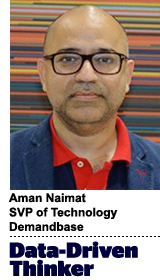
Today’s column is written by Aman Naimat, senior vice president of technology at Demandbase.
From scaling repetitive tasks to improving human-to-machine interactions, artificial intelligence (AI) has come a long way when it comes to freeing up our time and improving the quality of our day-to-day lives.
Over the course of the next 20 years, AI will continue to shape the broader business landscape, leading to new, more creative jobs. We’re already starting to see this take root in the digital marketing and advertising industries.
Take traditional B2B advertising, for example. With the exception of retargeting, it’s mostly spam but there is the potential for AI to turn irrelevant ads into meaningful conversations. Companies are also creating personalized one-to-one ads with AI and recommending content based on their audience’s needs.
But AI’s impact will extend beyond simply transforming industries. It will also pave the way for two discrete business phenomena to emerge: the rise of cross-global and cross-industry “super-conglomerate” companies, which will eventually give way to the demise of the mid-size company, and the single individual-based business or “self-entrepreneurs.”
The rise of the super-conglomerates
Before we talk about why mid-size companies will fail, it’s easier to understand why the Amazons of the world – or the super-conglomerates – will triumph.
In the world of AI, data is everything. Even if you rewind the tape to 1998, Jeff Bezos knew that capturing massive amounts of customer data would be invaluable.
We’re already seeing this pattern unfold. The super-conglomerates have a head start in figuring out how to capture and tap massive proprietary data from their users. They’re leveraging AI to target, build, distribute, market and sell their products. They’re building products on top of that data, targeting ideal consumers and delivering personalized and hypertargeted content – even to the point of speaking in the language of certain buyer personas – and they’re doing it all in real time.
In 20 years, these super-conglomerates will leverage their relationships and deep understanding of buyers and expand into all aspects of their lives, from work processing like HR and payroll to transportation, health care and education.
So where does that leave mid-size companies? Currently, most mid-size companies exist in niche markets where they can build, market and sell products through human-intensive methods with specific domain expertise that cannot be replicated by large companies. Such mid-size businesses can change market direction faster, personalize offerings and address needs of smaller markets.
But since mid-sized companies have with fewer customers and, thus, smaller amounts of data, they will be at a disadvantage to the massive user knowledge and data that large conglomerates will have to personalize products, attract users in real time and nurture direct relationships with them. However, if a mid-size company has disproportionately more data and user relationships than a larger company, it will dominate and dislodge the larger business to become the super-conglomerate.
Over the next 20 years, we’ll see these super-conglomerates rapidly expanding to new verticals and consistently improving customer experiences.
A new kind of entrepreneurship
As super-conglomerates take over, we’ll also see AI drive more solo entrepreneurs. They’ll be able to leverage inexpensive commodity technologies to cover most of the standard corporate functions such as finance, distribution, advertising and support so they can focus on their business’s primary product or service.
The super-conglomerates will provide all the standard horizontal functions of a business and further reduce the cost of starting a new business. We’ve already seen a glimpse of the early versions of this transformation with the emergence of a few cloud vendors. For instance, in the dot-com era the minimum venture investment to get a business live was $10 million but, by 2008-2009, you could get a basic digital product to market with $25,000 to $100,000.
Instead of being bogged down by the repetitive and tedious work of crunching data or doing financials, we’ll see independent marketing consultants be able to devote more time to creating content and generating leads. Entrepreneurs will be able to commit more of their time to strategy, branding and creative projects and tap the super-conglomerates to bring their AI muscle and reach to user marketing or product distribution.
New jobs, especially creative ones
Despite the rise of the super-conglomerates, we won’t all work for these companies. With highly repetitive human tasks covered by AI automation, people will be able to reclaim hours and explore more engaging and creative work. Positions that require strategy and creative thinking will be in high demand as they involve less repetition and will be more difficult to automate.
Imagine using all the time spent on repetitive tasks or paperwork to focus on your core strengths and passions. The marketing engineer who was once bogged down with data analysis will now have more time to creatively think about new techniques and methodologies. Positions involving negotiation, which are prevalent in sales, will no longer require a person to comb through massive databases to find answers. Instead, machines will help guide and support human buying and selling.
However, humans won’t simply sit back and put machines on autopilot. There will be an increased need for data scientists and newly created jobs such as AI process architects, a role that monitors and controls completely autonomous factories and business processes.
Overall, the workplace will become more efficient and well organized. The rote activities of past generations will no longer distract businesses from their core products. We’re already seeing positive results within the digital marketing and advertising industries. Soon, employees will gain back valuable hours, which they can spend with family or use to hone new skills in entrepreneurial endeavors or take on workplace passion projects.
Since there’s nothing more valuable and amazing than the human mind, it’s exciting to consider how gaining more time in our days – time that could be devoted to stimulating and productive work – will positively impact society.
Follow Demandbase (@Demandbase) and AdExchanger (@adexchanger) on Twitter.
This post was syndicated from Ad Exchanger.

